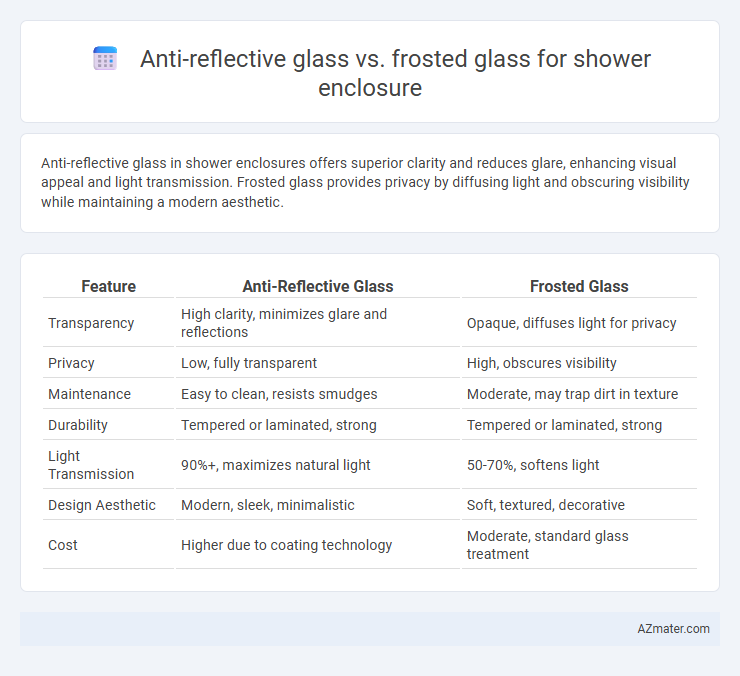Anti-reflective glass in shower enclosures offers superior clarity and reduces glare, enhancing visual appeal and light transmission. Frosted glass provides privacy by diffusing light and obscuring visibility while maintaining a modern aesthetic.
Table of Comparison
| Feature | Anti-Reflective Glass | Frosted Glass |
|---|---|---|
| Transparency | High clarity, minimizes glare and reflections | Opaque, diffuses light for privacy |
| Privacy | Low, fully transparent | High, obscures visibility |
| Maintenance | Easy to clean, resists smudges | Moderate, may trap dirt in texture |
| Durability | Tempered or laminated, strong | Tempered or laminated, strong |
| Light Transmission | 90%+, maximizes natural light | 50-70%, softens light |
| Design Aesthetic | Modern, sleek, minimalistic | Soft, textured, decorative |
| Cost | Higher due to coating technology | Moderate, standard glass treatment |
Introduction: Choosing the Right Glass for Shower Enclosures
Anti-reflective glass enhances visibility and clarity in shower enclosures by minimizing glare and reflections, creating a seamless and modern aesthetic. Frosted glass offers privacy through its textured, opaque surface while still allowing diffused light to pass, making it ideal for bathrooms prioritizing discretion. Selecting the right glass depends on balancing the desire for openness and light with privacy needs and style preferences in shower design.
What is Anti-Reflective Glass?
Anti-reflective glass is specially engineered with a thin, multi-layer coating that significantly reduces surface reflections, ensuring maximum light transmission and clear visibility in shower enclosures. This type of glass minimizes glare and improves aesthetic appeal by allowing the true colors and textures behind the glass to be seen without distortion. Compared to frosted glass, which obscures visibility for privacy, anti-reflective glass offers a sleek, transparent look while enhancing brightness and visual clarity in bathroom spaces.
What is Frosted Glass?
Frosted glass for shower enclosures is created by sandblasting or acid etching clear glass, giving it a translucent appearance that provides privacy while allowing light to pass through. This textured surface diffuses light and obscures visibility, making it ideal for bathroom settings where discretion is essential. Compared to anti-reflective glass, frosted glass prioritizes privacy and light diffusion over clarity and reflection reduction.
Visual Clarity: Anti-Reflective vs Frosted Glass
Anti-reflective glass offers superior visual clarity in shower enclosures by minimizing glare and reflections, allowing for an unobstructed and transparent view. Frosted glass, on the other hand, diffuses light to provide privacy but sacrifices clarity with its opaque, textured surface. Choosing anti-reflective glass enhances the open, bright look of the bathroom, while frosted glass prioritizes privacy at the cost of clear visibility.
Privacy Levels: A Comparative Analysis
Anti-reflective glass offers minimal privacy as it primarily reduces glare and reflections, making it suitable for shower enclosures where visibility is not a concern. Frosted glass enhances privacy significantly by diffusing light and obscuring visibility, ideal for bathroom settings requiring discretion. Comparing privacy levels, frosted glass provides superior coverage, while anti-reflective glass focuses more on visual clarity and aesthetic appeal without compromising transparency.
Maintenance and Cleaning Requirements
Anti-reflective glass in shower enclosures requires minimal cleaning due to its specialized coating that repels water spots and fingerprints, reducing the need for frequent maintenance. In contrast, frosted glass tends to accumulate soap scum and mineral deposits more visibly, necessitating regular scrubbing with non-abrasive cleaners to maintain clarity. Choosing anti-reflective glass can significantly decrease long-term cleaning effort and preserve a pristine appearance with less maintenance.
Durability and Longevity
Anti-reflective glass offers superior durability due to its specialized coatings that resist scratches and reduce glare without compromising strength, making it ideal for long-term use in shower enclosures. Frosted glass, while providing privacy through textured surface treatments, is more prone to wear and surface damage over time, which can diminish its visual appeal and structural integrity. The longevity of anti-reflective glass generally exceeds that of frosted glass, as its maintenance involves less frequent replacement or refinishing due to enhanced resistance to everyday bathroom moisture and cleaning chemicals.
Aesthetic Appeal and Design Flexibility
Anti-reflective glass enhances shower enclosure aesthetics by minimizing glare and reflections, creating a clear, seamless look that accentuates bathroom fixtures and tiles. Frosted glass offers design flexibility with varying opacity levels and patterns, providing privacy while allowing light diffusion to maintain a soft, inviting atmosphere. Both materials cater to different style preferences, with anti-reflective glass favoring modern, sleek designs and frosted glass complementing more textured or decorative interiors.
Cost Comparison: Anti-Reflective vs Frosted Glass
Anti-reflective glass for shower enclosures typically costs between $40 to $70 per square foot, reflecting its advanced coating technology that reduces glare and enhances clarity. Frosted glass is generally more affordable, ranging from $30 to $50 per square foot, due to its simpler acid-etched or sandblasted finish that provides privacy but less optical clarity. Considering installation, anti-reflective glass often requires specialized handling increasing labor costs, while frosted glass's standard treatment usually results in lower overall expenses.
Conclusion: Which Glass Type Suits Your Shower Enclosure?
Anti-reflective glass offers superior clarity and minimal glare, enhancing visibility and creating a modern, sleek look for shower enclosures. Frosted glass provides enhanced privacy and diffuses light, making it ideal for those seeking a balance of style and obscurity. Choosing between anti-reflective and frosted glass depends on personal preference for transparency versus privacy, as well as the desired aesthetic and functional needs of the bathroom space.

Infographic: Anti-reflective glass vs Frosted glass for Shower enclosure
 azmater.com
azmater.com